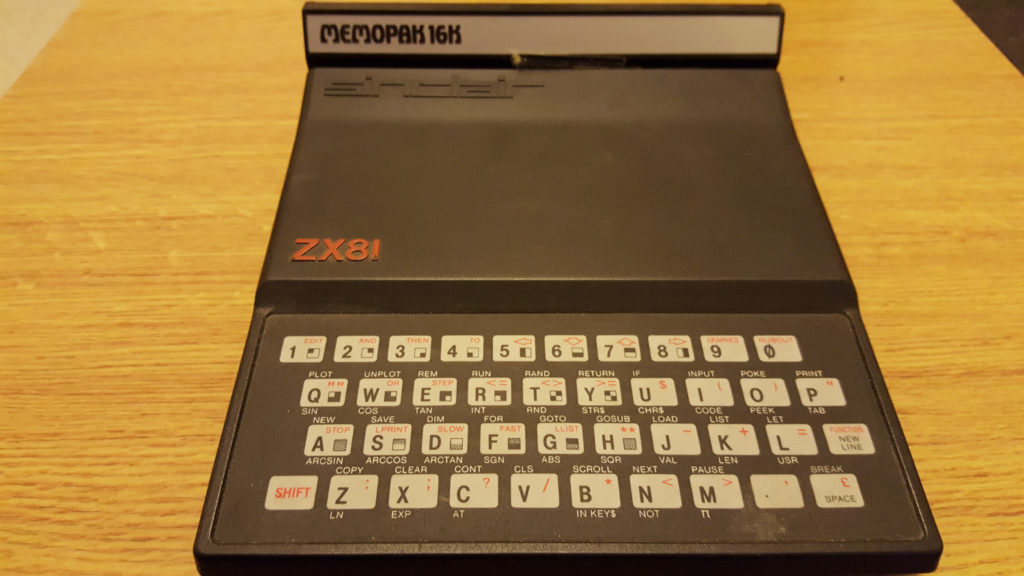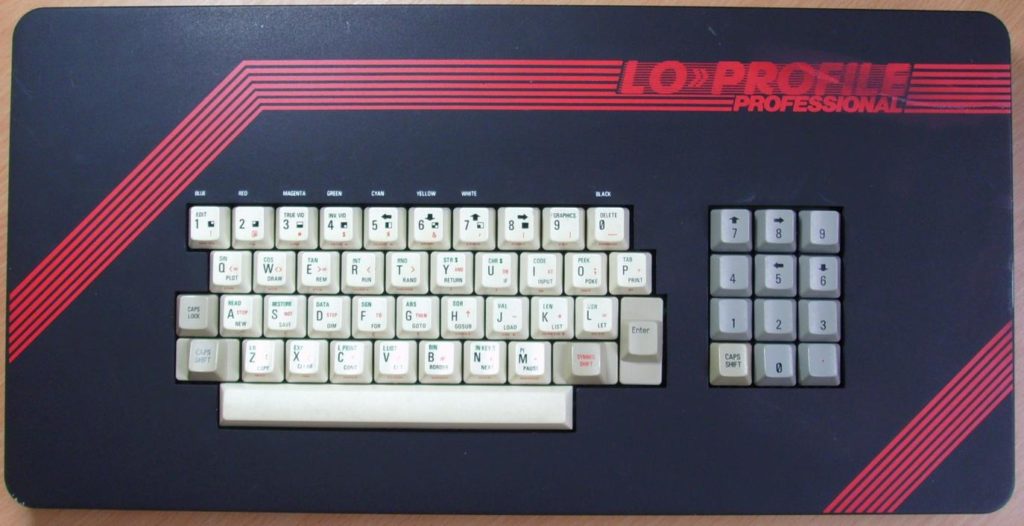Yesterday (Thursday 16th September 2021), I was sad to learn that Clive Sinclair has died.
When I was younger (back in the early 1980s), I had a passing interest in electronics. My dad (a telephone engineer) taught me to solder. I built a few kits. I could understand simple circuit diagrams. It never went very far though, but flicking through the latest issues of my dad’s electronics magazines I saw adverts for the Sinclair ZX81. A computer… An actual real computer! That you can own! I had to have one. I had no idea what I would do with it, but that didn’t matter!

That year I asked if I could have money from the family instead of presents for my birthday and Christmas, and that — added with some other money I’d saved — got me the £50 I needed. I took it into our local branch of Wigfalls as soon as the shops were open again after Christmas 1981 and walked out with my very first computer!
It certainly wasn’t the most powerful of machines. You had to plug it into the television for a monitor, and programs were saved onto and loaded from ordinary cassette tapes (it came with twin jack leads to connect it to the cassette recorder’s earphone and microphone sockets). It only had 1 kilobyte of memory, no sound, no colour and minimal graphics. And that keyboard? Oh dear… But I didn’t care about any of that!
Not long after, my dad bought me a black and white portable TV so I could plug my computer into that (I don’t know if that was to help me, or to free up the family telly!). I would spend hours with it in my bedroom, typing in programs printed in Sinclair User and Sinclair Programs magazines (which often didn’t work!) or patiently loading games off a cassette (which also often wouldn’t work, so you would have to rewind the tape, adjust the volume and / or tone levels slightly and try again). I loved it!
At some point a friend had a 16K RAM pack he didn’t need so I bought it off him. That had the legendary problem of “RAM pack wobble” where it would move ever so slightly while you were typing on the keyboard, lose its connection and crash the computer. One day, the RAM pack stopped working so I took it into the local branch of WH Smiths (where my friend had bought it) and they said they would replace it, but they didn’t have any in stock at the moment. So I waited, and waited… Eventually I went in to see if they had a replacement yet. They said they still hadn’t got any in, but they did have the Memopak one if I didn’t mind having one of those instead… I certainly didn’t mind. The Memopak was much better than the Sinclair RAM pack. It was contoured to fit the back of the computer, and it came with a unique and inspired piece of anti-wobble technology — two pieces of self-adhesive velcro that held the RAM pack firmly to the computer!
Then sometime in 1982, Sinclair released their new computer — the ZX Spectrum. It came as either a 16K or 48K model, had colour, sound (of a fashion) and a (slightly) better keyboard! It was a massive hit. As a result, nearly all ZX81 software vanished from the shelves. If this machine of mine was going to do anything, I was going to have to learn how to program it. So I did. I learnt a lot from the programs printed in the magazines. If they didn’t work then I would try to figure out what was wrong and fix it. I learnt which parts of the program were doing what, and was then able to adapt them to make the program different. Eventually I could sit and make programs of my own, from scratch.
This was the single moment that really did change my life forever. At that point I knew that I wanted to be a computer programmer for a living.
At some point in the early mid-1980s I got a friend’s old ZX Spectrum (the 48K version). It came with a carrier bag full of games, a joystick adapter, Quickshot joystick (I also had a Quickshot II, but I can’t remember if that came with it or if I bought it later), the classic Sinclair printer and a little sound amplifier. After a little while of persevering with the (slightly) better keyboard, I saved up and bought a “proper” keyboard for it.

I carried on learning to program with it (as well as play games. Lots of great classic games!), but now with colour and sound! I eventually added a speech synthesiser and — much later — a floppy disc interface with 5¼ inch floppy drive. It was the best damn Spectrum in town!
I took Computer Studies O-Level at school. I went on to the local further education college to take the B/Tec National Certificate in Computer Studies course where they taught us COBOL when nobody wanted COBOL programmers any more. It took me a while to get to my dream job. I took an evening course in C++ at the local college in the mid-90s, and then a Training For Work course in Manchester in 1997 where I learnt C and got my NVQ II Software Creation.
In the mid-90s I swapped my Spectrum for a friend’s Amstrad PC 1512 DD — an early IBM PC clone. I still think he got the better part of that deal. That was the start of many years of PC upgrades, and my first non-Sinclair computer.
I eventually got my first programming job in 1998, working on process control software in C on Unix machines. I also learnt Java in that job. And now, I’m a web developer using PHP. Post-pandemic I’m now working from home, still sat at the same desk that used to have my ZX Spectrum on it, using a PC which has sixteen million times more RAM in it than the little ZX81 I was so excited to buy and own nearly 40 years ago. I still have that ZX81 (pictured above). I don’t know why I thought to keep hold of it, but I’m so glad I did, and that I’m still able to hold it up, show it to people and say “look, this is my first ever computer!”
So, thank you Sir Clive, for having the vision to create affordable computers that would be brought into the home. Without that spark I really, genuinely do have no idea what I would have been doing now. He truly did help to create an entire industry as young people like myself learnt how to program computers and create an exciting new world. A remarkable future built on the legacy that he and others like him made for us.
RIP Sir Clive Sinclair, 30 July 1940 – 16 September 2021.